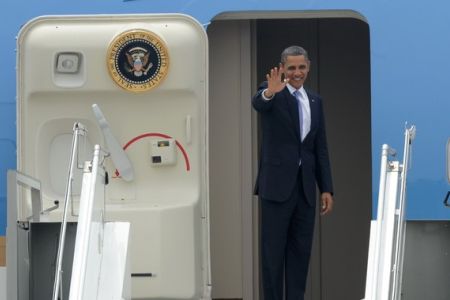Protests welcome Obama in Seoul

US President Barack Obama has arrived in South Korea to attend the G-20 summit in Seoul as activists stage protests against Washington’s policies around the world.
Prior to his arrival in Seoul, thousands of South Korean peace activists and civic group members took to the streets to protest Obama’s visit, saying the US president is not welcome in South Korea.
The activists have promised to continue their demonstrations until the summit kicks off on Thursday.
The protesters are opposing a free trade agreement between Seoul and Washington.
Disputes over foreign exchange rates and the world’s unbalanced trade are expected to dominate discussions in the two-day gathering.
The demonstrators say the deal harms South Korea’s agriculture and employment.
Obama is on a ten-day Asian tour to boost US trade relations with the continent. He faced similar protests in India and Indonesia on the first and second leg of his visit respectively.
Indonesians gathered outside the US Embassy in Jakarta several times to oppose Obama’s visit, calling on the government to reject the US president.
Muslim pundits say that the Obama administration’s conciliatory gestures toward some Muslim countries are a ploy to push ahead with the administration’s pro-Israeli agenda.
“We don’t see the differences between Obama and Bush, they both oppress Muslims, they both have blood on their hands,” CNN quoted Ismail Yusanto, a spokesman for a Muslim group in Indonesia, as saying on Sunday.
Meanwhile, the results of surveys conducted in several Muslim countries show that the Muslim world’s trust in US policies and President Obama has dropped drastically.
President Obama faced similar protests in India, where victims of a toxic tragedy in the city of Bhopal held a sit-in, demanding compensation for the fatal incident.
More than 500,000 people were exposed to toxic gas after 40 tons of deadly chemical leaked at the Indian subsidiary of the US Corporation Union Carbide on December 3, 1984.
The visit still continues to spark controversy in different parts of India.
Maoist guerrillas have gone on a rampage of destruction across the state of Bihar to protest the visit.
The guerrillas have called for a 24-hour shutdown throughout the state to protest Obama’s visit and the US government’s “imperialist policies.”
During his visit, Obama said Washington cannot impose a solution on the volatile India-Pakistan relationship especially when it comes to Kashmir.
The remark sparked anxiety among government officials in Islamabad due to fears that the US president’s visit could likely upset the delicate balance of power between the two nuclear-armed neighbors.
Obama is also expected to come under fire by G-20 member-states who object to the US Federal Reserve’s announced plans to pump USD 600 billion into its economy by the end of June 2011. Experts say the move is an attempt to boost America’s sluggish economy.
However, nations from Brazil to Germany have criticized the US policy, saying it will push their currencies higher and make their exports less competitive.
China has also blasted the US decision to inject hundreds of billions of dollars into the US banking system.
Chinese Vice Finance Minister Zhu Guangyao recently said Washington is ignoring its responsibility to support emerging economies.
“The US has not fully taken into consideration the shock of excessive capital flows to the financial stability of emerging markets,” Zhu told reporters in Beijing on Monday.
A report by The Washington Post said on Wednesday that the Federal Reserve’s move last week to print and pump billions of dollars into the US economy would continue to cloud G-20 debates.







